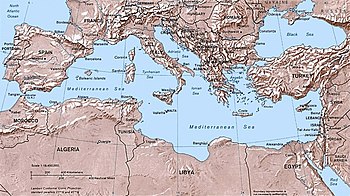| (Photo credit: Wikipedia) |
Skeletal remains in an island cave in Favignana, Italy, reveal that modern humans first settled in Sicily around the time of the last ice age and despite living on Mediterranean islands, ate little seafood. The research wass published in the open access journal PLOS ONE by Marcello Mannino and colleagues from the Max Planck Institute for Evolutionary Anthropology, Germany.
Genetic analysis of the bones discovered in caves on the Egadi islands provides some of the first mitochondrial DNA data available for early humans from the Mediterranean region, a crucial piece of evidence in ancestry analysis. This analysis reveals the time when modern humans reached these islands. Mannino says:
"The definitive peopling of Sicily by modern humans only occurred at the peak of the last ice age, around 19,000 -26,500 years ago, when sea levels were low enough to expose a land bridge between the island and the Italian peninsula".The authors also analyzed the chemical composition of the human remains and found that these early settlers retained their hunter-gatherer lifestyles, relying on terrestrial animals rather than marine sources for meat. According to the study, despite living on islands during a time when sea level rise was rapid enough to change within a single human lifetime, these early settlers appear to have made little use of the marine resources available to them. The authors conclude,
"These findings have crucial implications for studies of the role of seafood in the diet of Mediterranean hunter-gatherers."





